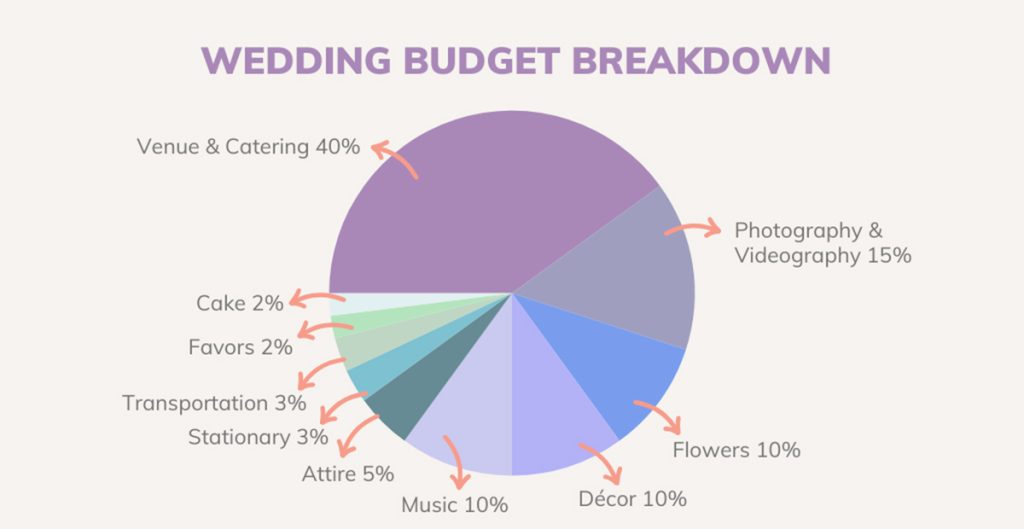It’s February! That means it’s the season of love and, apparently, engagements. Each year, about 2.8 million couples get engaged, most of them between November and February (according to The Knot.) If you are one of those lucky couples, it’s time to start saving! That’s because in Oregon, the average cost of a wedding is $19,000 (compared to $30,000 nationwide). It’s a big chunk of change, but you can take the sting out of it with communication, preparation, and a thoughtful wedding budget. Here are a few tips to get you started:
1. Set Your Budget
Before you book caterers or even shop for a dress, you’ll need to set a budget. Step one? Decide on the guest list. The number of people you invite will have a ripple effect on the cost of invitations, venues, food, favors, and décor. If you don’t already have a set budget, discuss what you can afford to set aside each month and multiply that by the number of months until the big day.

2. Build a Timeline
The next big question (after your budget and guest list) is the timeline. There’s no such thing as the “right” amount of time to plan a wedding, but you’ll save a lot of money and stress if you build your to-do list well in advance. Most experts suggest at least a year, but the longer you have to save, the better. So, cushion your timeline as much as possible. For most couples, the venue will dictate the timeline. If your ideal spot is only available in November, you’ll need to structure your timeline around that availability.
3. Formulate a Savings Plan
Once the budget and timeline are set, use a Savings Goal Calculator to map out how much you will need to set aside each month to reach your goal. If your budget is $19,000, for example, and your wedding is 12 months away, you’ll need to save $1,580 per month to meet your savings goal. Ask yourself whether that goal is realistic and, if it’s too daunting, ask for contributions to help minimize monthly costs. If that is not an option, consider downsizing or delaying the event.
4. Consider a High-Yield Savings Option
With your goals in place, decide where you will keep your money—ideally a joint checking or savings account separate from your everyday accounts. To maximize your savings, look for low-risk, high-yield savings options like certificates of deposit (CDs) and money market accounts. With a CD, you lock in a specific interest rate for the account term. So, you deposit a lump sum and (while you plan your wedding) the account builds guaranteed returns. Another option is to choose a high-yield savings account with at least some liquidity—like our Indexed and Premium Money Market accounts. These money market accounts offer better returns than traditional savings accounts but allow you to access your funds when you need to without penalty.
5. Cut Back on Spending
In the months leading up to your wedding, look closely at what you are spending and cut out unnecessary costs. Cancel unused subscriptions and memberships. Refinance your car insurance and investigate bundling options. Consolidate outstanding debts and pay down high-interest loans or credit cards. If you own your home, consider refinancing your mortgage to get a lower interest rate and reduce monthly payments. Limit your entertainment costs by eating out less. Get creative with dates and limit impulse purchases. Hold each other accountable but remember that it is also important to have fun.
6. Do Occasional Check-ins
To ensure you are on track for the big day, do regular check-ins—not just with your budget, but with each other as well. Keep a close eye on your progress and amp up the savings if you fall short. Most importantly, discuss how you are both feeling. A wedding budget takes a lot of work, but it shouldn’t take over your whole life. If the current plan has you stressed and struggling, reassess and make some changes.
7. Plan for the Unexpected
If any piece of wedding advice is universally true, it is to expect the unexpected. Things will cost more than you plan for. You will forget to budget for something. Last-minute changes or cancellations will add to your expenses. To combat this, build a buffer into your budget (at least 5%) and get everything in writing so you can minimize surprises.
A wedding is a momentous occasion, and it’s hard work, but it doesn’t have to be stressful. A careful budget (and an abundance of communication) can spell the difference between chaos and wedded bliss. If you’re having trouble getting started, sit down with your partner, and discuss your priorities. Work together to plan, save, and curb spending. After all, it is the marriage—and not the wedding—that will last. If you need help with accounts, direct deposits, loans, insurance, or refinancing, give us a call or stop by your favorite branch. We’re here to help you throughout your financial journey. And, if you have questions about preparing for the road ahead, just ask.
